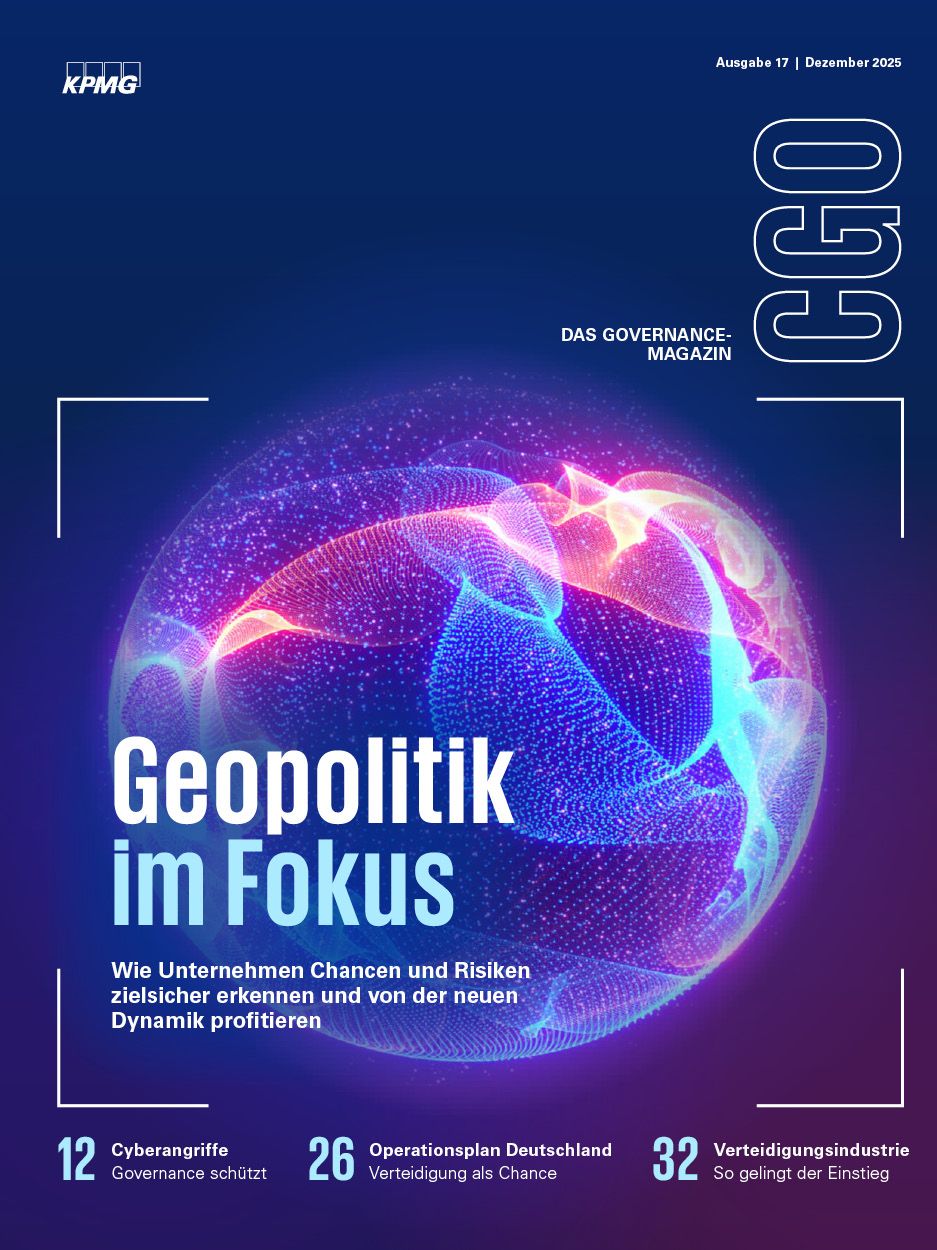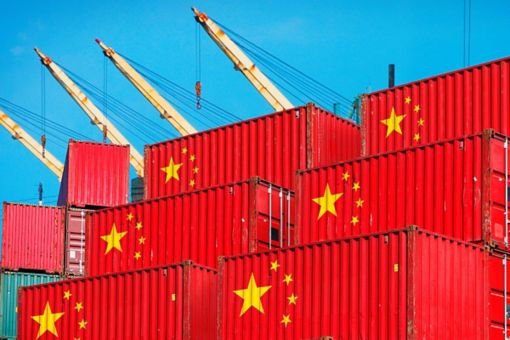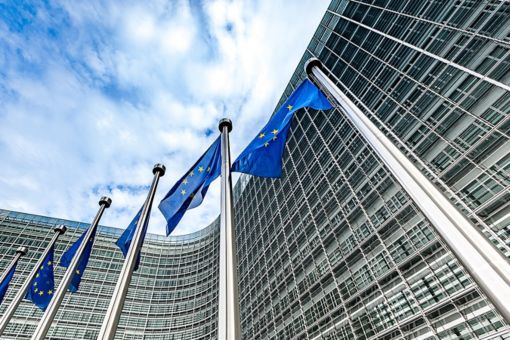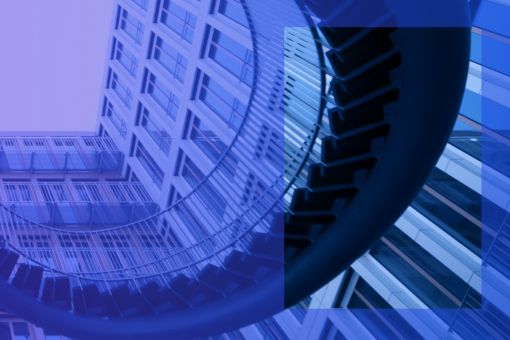Relevant questions | EU AI Act | CSRD | LkSG | EUDR | Client Cases | Insights | Your contacts
Managing companies is more challenging than ever - whether due to increasing regulation, expanded stakeholder expectations, sustainability transparency, geopolitical developments or an economically challenging environment.
On this topic page, you will find specific offers of support for your questions relating to effective corporate management, early risk identification, corporate culture, governance costs and digitalisation potential.
Learn about forward-looking entrepreneurial action - whether for international corporations, family businesses or SMEs.
Managing risks and acting compliantly
Our approach focusses on an integrated, innovative and holistic approach. The result of our support is a pragmatic organisational and operational structure that manages and monitors the relevant issues for your company in the areas of strategy, financial and non-financial reporting, compliance, operations and ESG.
Through holistic and integrated management, we enable you to organise your processes more effectively and efficiently and achieve greater acceptance among your employees - in accordance with the relevant IDW and ISO standards.
To the compliance solution (in German)
With KPMG and KPMG Law, you will find the right legal strategy and customised services for your specific requirements. Our interactive platform allows you to put together your offer quickly and easily. Select the relevant area of law and the service that is right for you. If, in rare cases, the required PDF is not yet available, we will be happy to send it to you.
Relevant questions on the path to effective governance and compliance
How is governance to be defined in the company? What should be the goal and what can be the added value?
Governance encompasses the overall control of the company and thus also the early identification of opportunities and risks from the strategic, operational, economic and legal areas. In order to generate added value for the company, this control must be integrated into the daily business.
Which topics and risk areas are currently affecting the company and will most likely do so in the future?
The effects of the pandemic, climate change, the energy crisis, political conflicts, decoupling - these are just a selection of the topics that are currently occupying the economy and will probably continue to do so for some time to come. In addition, technological developments present opportunities and risks for existing business models. Effective risk management must identify and address such issues and assess and manage their impact on the company and its business model.
Which regulatory compliance requirements does the company currently have to deal with, and which ones are likely to come up in the future?
The current issues also lead to new or stricter regulatory requirements, for example on sanctions, occupational safety regulations, human rights or CO2 regulation. A reassessment of corruption risks in the existing frictions in the supply chain is also a must. Compliance management must therefore be geared towards monitoring legal changes, evaluating them for the company and taking appropriate measures.
How can these requirements and risks be identified, assessed and then managed in the current risk and compliance management systems - and without blocking the business, but rather making a significant contribution to it?
Risk assessment in the company should be centralised and integrated in order to ensure a uniform view of the risks and to do this as efficiently as possible. Risks should be managed directly in the business processes in order to be able to intervene at an early stage and prevent additional work, for example by checking for sanctions in sales. There must always be room for decentralised solutions that can adequately take into account business model differences, varying corporate cultures as well as organisational characteristics. We are talking here about horizontal issue integration, vertical process integration with simultaneous decentralisation and strong value management.
EU AI Act
We use our expertise to help you understand and implement the requirements of the EU AI Act to ensure the smooth integration of AI technologies while maintaining compliance and ethical standards.
Corporate Sustainability Reporting Directive (CSRD)
We support you in the transition to CSRD-compliant sustainability reporting by guiding you through every step of the ESG reporting process. We also help you to capitalise on ESG-related opportunities.
Supply Chain Due Diligence Act (LkSG)
We help you to identify, assess and mitigate risks in your supply chains while ensuring ethical standards along the entire supply chain to fulfil the requirements of the LkSG.
EU Deforestation Regulation (EUDR)
Together, we develop customised strategies to make the traceability of your company's goods more transparent. This puts you in a position to meet the requirements of the EUDR in the best possible way.
Corporate Sustainability Due Diligence Directive (CSDDD) – German Publications
We support you in identifying, assessing and mitigating human rights and environmental risks in your supply chain in order to fulfil your due diligence obligations under the EU Supply Chain Directive. We also help you to draw up a climate plan in which you strategically demonstrate how your company can contribute to achieving the 1.5°C target.

KPMG Zukunftsgipfel: Finale
Vier Bühnen zu den Themen ESG, Governance & Performance, digitale Transformation und International Business sowie Branchen-Insights am 12. Juni 2024, 14:00–17:00 Uhr
Jetzt anmelden
Our governance client cases
Insights on governance topics (in German)
Your contacts

Dr. Konstantin von Busekist*
Managing Partner, Head of Global Compliance Practice, KPMG Law EMA Leader
KPMG Law Rechtsanwaltsgesellschaft
Dr. Michael Falk
Partner, Consulting, Cyber Security
KPMG AG Wirtschaftsprüfungsgesellschaft
Stephan Ludwig
Partner, Tax, Head of Tax Transformation
KPMG AG Wirtschaftsprüfungsgesellschaft
Stay up to date with what matters to you
Gain access to personalized content based on your interests by signing up today
Dennis Andre Olsinski
Partner, Audit, Regulatory Advisory, Digital Process Compliance
KPMG AG Wirtschaftsprüfungsgesellschaft
Timo Purkott
Partner, Financial Services
KPMG AG Wirtschaftsprüfungsgesellschaft
Connect with us
- Find office locations kpmg.findOfficeLocations
- kpmg.emailUs
- Social media @ KPMG kpmg.socialMedia
* Legal services are provided by KPMG Law Rechtsanwaltsgesellschaft mbH.























